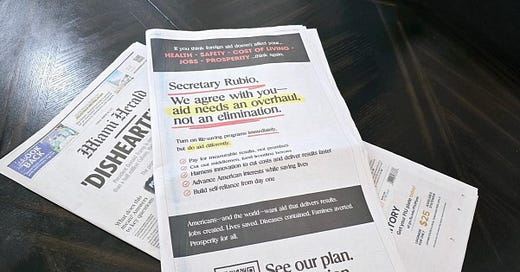Our $1 Billion Miami Herald Challenge to Secretary Rubio: It’s Time for the #AidWeWant
Our proposal to deploy $1 billion in life-saving aid in days and weeks, not months and years
Dear Unlock Aid community,
Today, we published an open challenge in the Miami Herald – Secretary of State Marco Rubio’s hometown newspaper – calling on him to restart life-saving programs, but to approach U.S. foreign aid in a fundamentally new way.
A recent court ruling mandates that tens of billions of dollars in funding already approved by Congress must be spent by September 30, creating an available set of funds that Secretary Rubio can immediately deploy to:
Save lives and prevent disease spread to protect America’s public health;
Demonstrate a more modern and results- and partnerships-based approach to aid;
Transition long-term funding and management to local actors against time-bound goals.
This is our most urgent appeal given how many lives hang in the balance due to the recent freeze on U.S. foreign aid.
Our $1 Billion Challenge: Think Bigger, Act Faster
We’re challenging Secretary Rubio to restart life-saving programs and immediately deploy at least $1 billion of funding already approved by Congress for global health to showcase a new approach for U.S. foreign aid. Frontline organizations stand ready to absorb these funds and deliver specific, measurable, and ambitious results within days and weeks, not months and years. Specifically, we’re calling on Secretary Rubio to use this funding to:
Pay for measurable results, not promises – Only release funds when real, verifiable improvements happen, backed by transparent reporting for accountability. (Provide up-front funding to get started with subsequent payments tied to results delivered.)
Cut out middlemen, fund frontline heroes – Disburse funding directly to the organizations closest to the challenges.
Harness innovation to cut costs and deliver results faster – Leverage evidence-based approaches and technology to reduce costs, scale what works, and verify results.
Advance American interests while saving lives – Transform traditional aid relationships into mutually beneficial partnerships where host country partners co-design and co-invest.
Build self-reliance from day one – Commit to shifting long-term management to local actors, promoting genuine self-reliance.
Finally, Secretary Rubio should clearly define success from the outset, set transparent and measurable goals, and publicly report progress rapidly.
With these principles, we can transform the typical approach to U.S. foreign aid into a nimble, results-driven engine that serves both local communities and American interests.
Once we demonstrate this approach works, replicate it in other sectors, regions, and scale it further in health.
Click here to read more about the challenge.
Real Solutions, Ready to Go
This proposal is something Secretary Rubio can announce immediately because we don’t need to start from scratch. Across the globe, there are organizations ready to get to work on the basis of delivering results. In countries like Ghana and Kenya, for example, the U.S. government could partner with:
Local community health workers and faith groups that already provide essential care to millions every day.
Private pharmacy networks, tele-health companies, and direct-to-consumer healthcare platforms that use market-based solutions to deliver medicines and tests.
Modern logistics companies that use fast, transparent supply chains to get medicines where they’re needed with 99% on-time delivery.
Mobile money providers that enable secure, instant, and traceable payments.
World-class tech platforms to help decision makers rapidly collect and analyze data, and to determine how to allocate life-saving resources in real time.
These organizations know their communities and have proven business models that work. But they've too often been left out of U.S. aid programs because the system wasn’t designed with them in mind. Worse, traditional aid has frequently displaced opportunities for this new generation of organizations to have a bigger and more sustainable impact.
The solution is simple: Go directly to these proven partners, set clear goals, help them scale their impact, and get by accountability by paying them when they deliver results. Set ambitious, time-bound goals to transition funding for these programs locally through host government health systems or as self-sustaining businesses.
Join Us to Build the #AidWeWant
Last week, we kicked off our #AidWeWant campaign with an open letter to Secretary Rubio. Read “It’s Time to Reimagine Foreign Aid,” published yesterday in the print edition of the New York Times, which highlights how Unlock Aid is rethinking U.S. foreign aid for faster impact, more local self-reliance, and for more modern partnerships.
Today’s $1 Billion Challenge is just the first in a series of proposals we’re unveiling this week, showcasing how a new approach to global engagement can:
Get better results for every taxpayer dollar
Reduce red tape
Spur innovation and competition
Strengthen self-reliance among local partners
Advance American interests while meeting global needs
This isn’t about small tweaks to an outdated system. It’s about reinventing how we partner with communities worldwide. Let’s seize this moment and shape the future of U.S. global engagement together.
Join our campaign. Spread the word. And let’s show Secretary Rubio – and the world – that it’s time for the #AidWeWant.
To Progress,
Unlock Aid




Thank you for highlighting how much progress is stalled by bureaucratic inertia. Every day of delay carries real-world consequences: fewer vaccines delivered, fewer HIV prevention tools deployed, and fewer clinics reaching the people who need them most. We need to cut the red tape and get funds flowing where they matter most—on the ground. People and the planet can’t afford to wait.
This is a good initiative. We really need Rubio to show the better angels of his nature. They've been hidden so far - and I'm coming to wonder whether he has any.